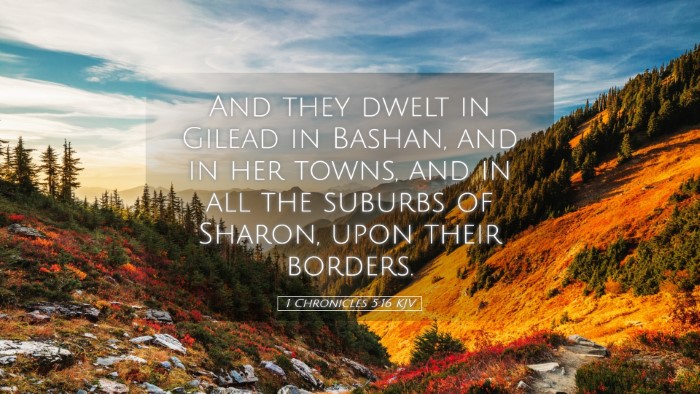Commentary on 1 Chronicles 5:16
Verse: "And they dwelt in Gilead in the borders of Bashan, and in their villages, and in all the suburbs of Sharon, upon their borders." (1 Chronicles 5:16, KJV)
Overview
This verse encapsulates a significant moment in the historical context of the Israelite tribes that settled in the eastern territories. The mention of Gilead and Bashan emphasizes the geographical and strategic importance of these regions, as they were known for their fertility and fortifiable landscapes.
Geographical Context
In studying this verse, it is crucial to comprehend the geographical boundaries mentioned:
- Gilead: A region east of the Jordan River, known for its rich pastures.
- Bashan: Renowned for its strength and fertility; often associated with the powerful pastoral economy.
- Sharon: A fertile plain that was known for its beauty and abundance, important for agriculture.
Theological Insights
This verse provides insights into the settlement patterns of the tribes and their adaptation to the land. Several commentaries highlight these theological implications:
Matthew Henry's Commentary:
According to Henry, the tribes mentioned “dwelt in their villages” implies a sense of community and social structure, where each member facilitated the growth of a cohesive society. Gilead and Bashan were places of refuge for the Reubenites, Gadites, and half-tribe of Manasseh. They represent more than mere geographic locations; they reflect the divine providence in establishing homes for God’s people.
Albert Barnes' Notes:
Barnes emphasizes the importance of the land and its connection to the covenant practices of the Israelites. “Their villages” indicates a settled life that bespeaks of stability and prosperity. The mention of “suburbs” signifies both the physical boundaries and the spiritual protection afforded by the Lord. This can be seen as a reward for their faithfulness and a divine blessing for their past struggles.
Adam Clarke's Commentary:
Clarke explores the socio-political landscape of Gilead and Bashan, noting that these regions had strategic advantages. The tribes, by establishing themselves in these locations, not only secured their existence but also positioned themselves favorably against surrounding nations. Clarke further discusses the pastoral life prevalent in these areas, relating it to both physical sustenance and spiritual nourishment.
Historical Context
The historical significance of this verse is also noteworthy. The Reubenites, Gadites, and half-tribe of Manasseh chose these territories upon the conquest of Canaan, as they recognized the land's potential for their herds and families. Commentaries point out that this reflects a duality between physical abundance and spiritual allegiance, as they settled distinctively apart from the other tribes.
Spiritual Application
In facing contemporary issues, pastors and theologians can draw several applications from this verse:
- Community and Belonging: The emphasis on their villages underscores the importance of community in faith. It serves as a reminder to foster environments where people can thrive spiritually and socially.
- Divine Provision: The acknowledgment of God’s providence in these settlements reassures believers of His constancy and grace in circumstances of transition.
- Strategic Positioning: Just as the tribes were strategically placed, modern Christians must also be mindful of their spiritual positioning within the broader context of the church and society.
Conclusion
1 Chronicles 5:16 highlights the importance of geographical identity among the Israelites while underscoring the depth of community, divine providence, and historical relevance. The reflections of Matthew Henry, Albert Barnes, and Adam Clarke provide valuable insights into interpreting this verse for today’s believers, encouraging a heartfelt engagement with both the text and its broader implications for faith and community.


